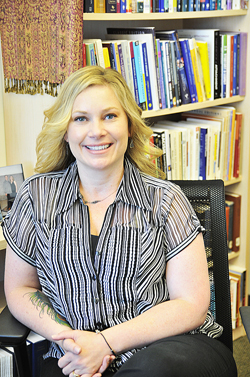“Marriages and Families in the 21st Century: A Bioecological Approach” looks at the factors—peers, media, schools and culture affecting families. It also examines the issues—divorce, domestic violence, gender roles and work-life balance—they face.

“I’ve been teaching for many years and had always struggled to find an appropriate textbook for my class,” said Howe, who teaches the undergraduate general education course “Family Relations in Contemporary Society” at HSU.
Traditionally, most textbooks only examine the ecological, or social factors in families. For example, when looking at divorce, they might examine how parental depression is related to divorce, or the economic consequences of divorce. Howe’s textbook includes those analyses but goes a step further by examining biological factors. For example, certain people may have genetic predispositions to experience stressors like divorce and people may experience physiological or neurological changes after divorce.
Published by Wiley-Blackwell, the 640-page textbook features chapters on dating, raising children and aging. Students read essays written by real families and are encouraged to think about families from different cultures and analyze their own families using a “strengths-based approach.”
Howe says that many people focus on family structure¬—the fact that a family has two fathers or that a child was born to a teen mother—when they should be focusing instead on family processes such as values, support, love, openness and discipline.
Similarly, many people still romanticize the Standard North American Family (SNAF), a model consisting of the breadwinner father, the homemaker mother and two children. That ideal never existed for the majority of American families, Howe argues.
“The truth is that there were no good old days like we envisioned on TV. Why are we clinging to this ideology that the SNAF is better than others? It affects our social policy, how we judge other people and how we view our own families,” Howe says. “Regardless of how wacky or weird your family is, my goal with this book is to get students to focus on the strengths of their family and analyze the process dynamics at a deeper level.”
Howe’s textbook is interdisciplinary, meaning that it can be used in family studies, social work, sociology, nursing, psychology and child development. HSU students provided research support and several Humboldt County families are featured.
“Marriages and Families in the 21st Century: A Bioecological Approach” is available for purchase at the HSU bookstore, from the publisher at http://www.wiley.com/WileyCDA/WileyTitle/productCd-1405195010.html or Amazon at http://www.amazon.com/Marriages-Families-21st-Century-Bioecological/dp/1405195010.